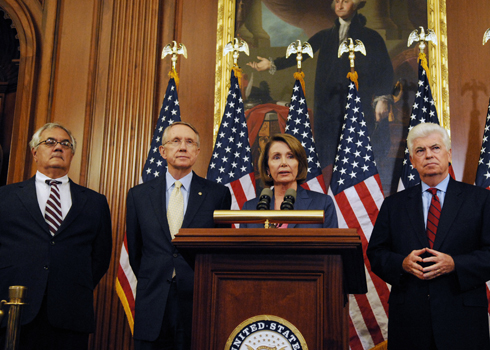President Obama might be on the verge of signing a Wall Street reform bill that makes the U.S. economy more vulnerable to a major financial crisis. At least, that’s the view of some experts, both in the Obama administration, on the Hill, and outside, who believe that, amid the anti-bailout fervor consuming the country, Congress and the Treasury Department became too eager to eliminate all future bailouts, and robbed the government of the legal authority they might need in the future to save the economy.
“In general, this is a symptom of the panic that Congress has developed about being seen to allow any form of future bailout,” says Doug Elliott, a financial expert at the Brookings Institution, “I say ‘panic’ because it has prompted a number of limitations that we may come to sharply regret in a few decades when we hit the next truly severe financial crisis.”
No administration or Congressional officials would comment on the record about internal disagreements over the Wall Street reform bill, but sources suggested that TPM examine the way the bill handles money market funds — not the consumer investment vehicles, but the financial institutions that invest in short term debt and nearly threatened to take down the economy after Lehman Brothers collapsed in September, 2008.
When Lehman went under, it sent huge ripples throughout the entire financial system, but most immediately, it caused a money market fund called the Reserve Fund, which owned a small amount of Lehman’s debt, to buckle under the strain. Panicked investors pulled their cash out of money market funds everywhere, leaving the industry unable to finance corporate debt. Suddenly major companies — financial and non-financial — were on the verge of insolvency, unable to meet their payrolls.
Fortunately, the Treasury Department found a thin reed of legal authority by which to backstop money market funds before the TARP legislation passed and the worst consequences were averted.
But fast forward to the near future. Under the terms of the Wall Street reform bill, a company like Lehman Brothers would be put through resolution, meaning its investors — including money market funds — would take substantial hits as the firm gets liquidated. At the same time, according to Elliott and others, the government will be unable to prop up the funds in the event of another run, because the bill also eliminates that authority. That means the same companies that teetered on the edge of bankruptcy in the midst of the Lehman collapse will no longer have a safety net.
Other observers have highlighted these specific problems in the legislation for months. Writing of an earlier version of the legislation back from April, financial reform analyst and hedge fund owner Thomas Brown declared that “even at its most basic objective, the bill doesn’t do what it’s designed to do.”
But the crossing of fingers and hoping for the best isn’t confined to wealthy financiers. It’s also happening among the bill’s supporters and architects.
“A bailout beats an economic depression every time,” Elliott says.






